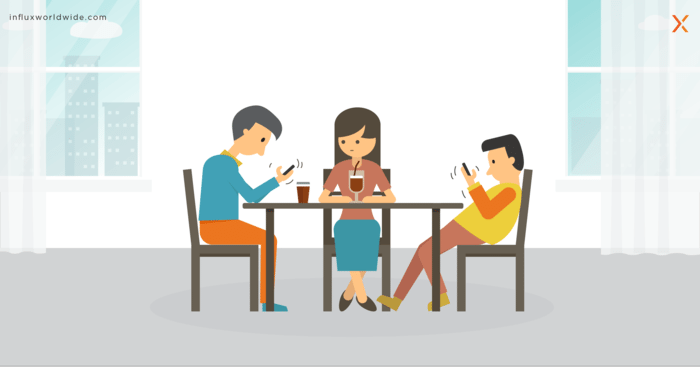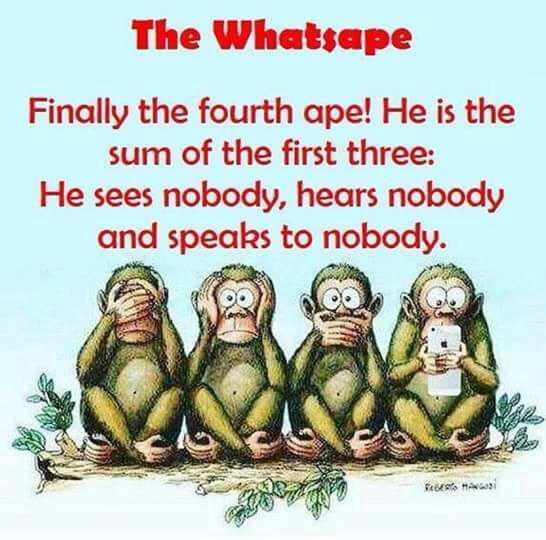What the Phub!
| Vaidehi Bhashyam Mehta | @mehta_vaidehi
V: “Hi! How are you!?”
V’s friend: “Just a sec….”.
V: “Haven’t seen you…”
V’s friend: “Sorrryyyyy! One second….”
V: “… in a while…..”
V’s friend: “Sorry, sorrry! Just had to reply this message from work! So, how are you?”
V: “I’m well! How have you been?”
V’s friend: “Fine, fine…. Dash! Another message!”
V: “Sure, no problem…. (I think…)”
V’s friend: “Gosh! Kate Spade and now Anthony Bourdain!”
V: “Huh?”
Ok, Am I being phubbed?
Oh yes, I most definitely was. #
This was just a few weeks ago and it’s not the first time that I’ve been interrupted with “just a second”, or “I just have to take this call” and “Sorry, can I just answer this message?”.
These are the really “polite” phubbers. The others will ignore you in favour of their phones, not so much because they want to be mean to but because what they are doing/seeing on their phones is more important to them than you are.
I’d understand when it’s a work-related matter, or an emergency. Sometimes you just have to reply a message or check on what’s happening. I can also understand that, in a close gathering, you want to show the others pictures of the little cuties in your family or check a quick fact that pertains to the conversation. That’s alright. Go ahead. I’m sure the company you are keeping will understand. But always and continuously? You are phubbing.
Phone + Snubbing = Phubbing #
Phubbing refers to the uniquely 21st century phenomenon of ignoring the person in front of you in favour of your phone. The term was coined sometime in 2012 in an effort by McCann, an Australian ad agency in association with the Macquarie Dictionary. The neologism emerged out of a conference of language experts — authors, poets and lexicographers — organised by McCann to discuss people’s mobile phone behaviour.
A new word is born and an awareness was created about mobile phone culture and how we as a people behave today.
Australia is also where the #StopPhubbing campaign was started to address the problem. There’s a whole website that discusses the issue, offers anti-phubbing downloads, decals and even wedding place-cards, and invites you to “stage a phubbing intervention” by sending emails to phubbers, “intimating them that their phubbing days are over.” You’re also encouraged to capture an image of a phubber and upload it on this site to “shame a phubber.”
Whether this is extreme or not is a matter of opinion, but surely something needs to be done.
News: The smartphone is the new relationship-buster, right up there with money problems and bad sex. #
Admittedly, this is an issue more rampant abroad than in India, where, likely, you’ll get phubbed only if you go urban. According to the Pew Survey 2017, 78% of India’s population doesn’t possess smartphones and 80% are clueless about social media. So phubbing is still a little while away in this country.
Why do we behave the way we do? #
I do get that news of a celebrity’s sudden passing is really sad just as I fully understand the elation that comes when a home team scores a spectacular win. The internet is an awesome source of information and so much of what is happening around us would reach us not-so-instantaneously if we did not use it.
I work in digital marketing and can never undervalue the importance of information and communication technology today. But, regardless of what anyone has to say, nothing can justify bad manners and I do believe that my urge to walk away from phubbers is justified.
The urge #
I said I feel the urge to walk away. But do I? No. I stay put and tolerate the bad behaviour. Why? I guess it’s conditioning; we’re conditioned to be polite even when the other person is not. Because we don’t want to risk picking a quarrel or create bad blood with the phubber.
Of late, though, I have been asking myself if I really should tolerate being phubbed. How often would you stay passive in the face of verbal snubs? Depending on your nature:
- You’d give as good as you got
- You’d try to be patient a few times
- You’d complain to others about it
- You’d swallow the insults and allow the resentment to build inside you
It doesn’t take a quantum physicist to know that the last two options are not bright ones. I’d give the first option marks for knowing what you want and speaking your mind about it. Often, it’s best to say what you want to and be done with it.
But, the second one wins hands down. You show that you are tolerant; that you are allowing for the fact that the phubber is really on something important; that you do not blow people out of the water as soon as they start to annoy you.
Clearly, unaware #
The fact is that phubbers are generally blissfully unaware that they are being ill-mannered. And, it isn’t just young people who phub you. Older people — who should know better — have become phubbers too. They’re so FOMO (without knowing what the heck that expands to) about their smartphones that they just will not let go of them.
It’s also unfortunate that even in formal events, where an announcement has been made that the audience turn off their phones or put them in silent mode, you might hear a ring or ping tone. Or catch someone surreptitiously checking for messages.
Isn’t it time someone told them — as politely (or not) as possible? That it’s rude to tap or swipe away at your phone when you’re trying to have a conversation with them? I think it’s necessary to let people know that they must stop fiddling with their phones when you’ll are together and give yourselves a chance to just sit and talk. As it is, real conversations are becoming rarer with text messaging. Why continue to do that even when you are with a group of people who are gathered to meet and be with each other?
Try this #
Designate time for people. Set aside your phone(s) and just talk to your friend(s) / family for an hour.
Have a “no mobile phones” policy at mealtimes. You’ll find it’s a great time for bonding and you’ll also savour the food you eat. People report that the food they’re eating doesn’t taste good when they are being phubbed.
When in an auditorium or meeting, turn off the phone when asked to, rather than put it on “silent” mode. This will ensure you are not disturbed by your phone buzzing in your pocket or tempted to check what you think you might have missed out on.
Try turning off data and wifi on your phone for the time you are with your friends. If it’s important, whoever wants to reach you will call and you can explain you are in company.
I’m sure all of you have been phubbed at least once. I’d love to know how you handle the situation. Do tell!
Signing off…
Vaidehi Mehta is our Content Strategist, curating and writing content across multiple platforms. She is a teacher and trainer with degrees in Economics, English and Education. Having dealt with reams of content with varying levels and versions of English, she is currently a ‘grammar pacifist’, prone to the occasional sigh.


